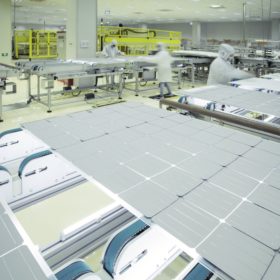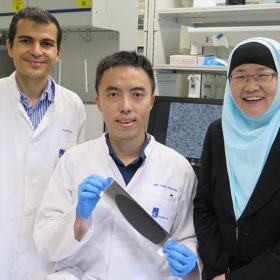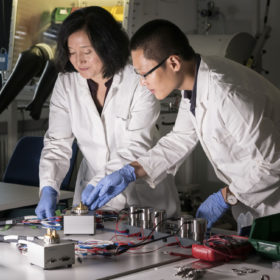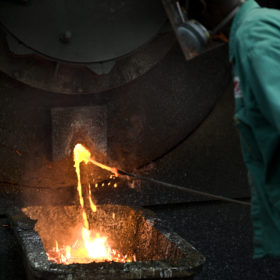The weekend read: A lead-free future for solar PV
Lead plays an important role in crystalline silicon module manufacturing when it comes to cell interconnection. But even in small amounts, the presence of this toxic material in a PV module could be viewed as a black mark against the industry’s sustainable credentials. Alternatives are available, but it seems the price is not yet right for broader uptake.
Carbon nanotubes provide a boost to perovskite solar
Scientists at the Tokyo Institute of Technology have developed a carbon nanotube which forms a strong junction with a lead-halide perovskite, improving performance and stability.
US scientists create first rechargeable lithium-carbon dioxide battery
Researchers in Chicago have developed a world first fully rechargeable lithium-carbon dioxide battery, an achievement they claim could pave the way for the use of the greenhouse gas in advanced energy storage systems.
Wacker slashes profit forecast amid polysilicon price slump
German polysilicon producer Wacker Chemie AG has reduced its earnings expectations for 2019, citing low prices for polysilicon. The company blamed the polysilicon price slump on oversupply from competitors in China, which muted an expected price increase in the second half of 2019.
UK: Give more power to regulators, says report
A report published recently by the United Kingdom’s National Infrastructure Commission says that the UK’s regulatory system must “adapt to meet the demands of the future” by providing new powers for regulators to ensure utility investments in sustainable infrastructure. The report notes that without such powers, the country will be unlikely to meet its target of zero emissions by 2050.
A new battery mix to prevent dendrites
Scientists at the United States Pacific Northwest National Laboratory have discovered a root cause of dendrite formation, which can cause battery failure and even fires in lithium-ion technology. With this new knowledge, the group is now working on electrolyte recipes that eliminate dendrite growth entirely.
A carbon scaffold to boost lithium-sulfur performance
Scientists at Singapore’s Agency for Science, Technology and Research have developed a new method to produce lithium-sulfur based cathodes which exhibit stable performance and high storage capacity over 200 cycles. According to the agency, this represents “a promising step towards the commercialization of lithium-sulfur batteries.”
JA Solar granted intellectual property rights for Ga-doping technology
The Chinese company has announced it has acquired intellectual property rights pertaining to various applications of gallium-doped silicon wafers in solar cell applications from Japanese company Shin-Etsu Chemical.
Calcium batteries cool down with new electrolyte
Scientists at Germany’s Karlsruhe Institute of Technology have developed a new class of electrolytes they say could bring calcium batteries – currently only a lab technology – a step closer to being a practical reality for energy storage.
Do lead batteries have a role in the clean energy transition?
The Consortium for Battery Innovation has outlined research goals for advanced lead-based battery concepts, claiming the potential of the technology is “nowhere near fully exploited”. The group, comprised of lead-battery industry stakeholders, says such devices can play an important role alongside lithium-ion and other storage technologies in electric vehicles, renewable energy storage and other applications.











